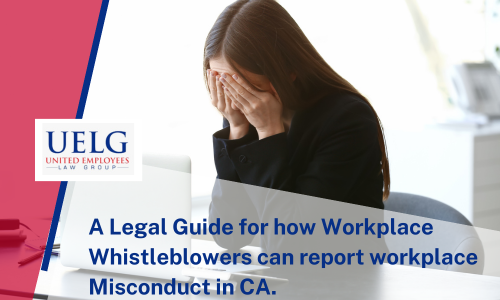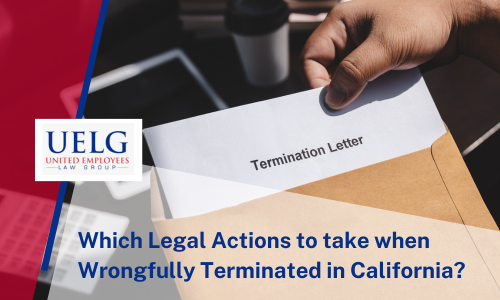Whether a worker is classified as an independent contractor under California’s independent contractor law, or as an employee, is primarily based on the duties of the worker. Given California’s dynamic employment landscape, understanding the nuances of classification as an employee, or as an independent contractor, is crucial. Contact us here at UELG if you want to learn more details about independent contractor law, or if you are looking for experienced and knowledgeable attorneys to help you determine whether you were properly classified. If you are or were not properly classified, we can help you navigate the complex legal system to protect your rights.
Independent Contractor vs. Employee: A Quick Differentiation
It is critical to differentiate, and be aware of the distinctions between, classification as an independent contractor, versus an employee. Quite often, an employer may classify a worker as an independent contractor, when under California law the worker should be classified as an employee. Such misclassification may result in grave financial consequences and penalties to the employer.
In California, an independent contractor, generally, is an individual who works independently, offering services or expertise in various fields, typically free from the control and direction of the hiring entity. Independent contractors frequently work in the gig economy in positions where work is performed for different companies, such as consultants, craftspeople, or trades independent of the hiring entity. Generally, the capacity of independent contractors to operate independently in their established trade and make their own schedule, among other things, distinguishes them as independent contractors, rather than as employees.
The distinction between an independent contractor and an employee is primarily one of degree of control and freedom. The way independent contractors do their work and handle their time is generally more flexible than that of an employee. Independent contractor status may be found to exist where the worker is independently incorporated or licensed, engages in separate advertising for the services provided, and offers services to a number of potential customers. If a worker’s services are offered only to a single employer, the worker is less likely to be deemed an independent contractor, and instead may be determined to be an employee. The independent contractor law in California’s Labor Code provides for exceptions to “employee” status, to include the business-to business exception, referral agencies, professional services, and one-off engagements. A discussion of these exceptions to employee status is beyond the scope of this blog.
The terms and circumstances of an independent contractor working relationship can often be outlined in an independent contractor agreement. These agreements can specify the scope of work, payment terms, confidentiality clauses, and other relevant terms, and can help to prevent worker misclassification issues, and ensure that both parties understand their respective roles and responsibilities. While these agreements are important, they are not conclusive as to employment status and are only one of the factors California courts look to when determining a worker’s status as an independent contractor or an employee.
What is the impact of California’s wage and hour laws on independent contractors, employees and employers?
California’s wage and hour laws generally only apply to, and protect, persons classified as employees, not independent contractors.
For workers, the distinction is critical. If you are classified as an employee, California laws establishes, among other protections, minimum wage standards, overtime regulations, and break time requirements. Employees are also eligible for (if offered by the employer) employment benefits such as health insurance, vacation, retirement plans, or paid time off, for which California law may offer protections. By contrast, independent contractors are not covered by California’s wage and hour laws, and are generally not eligible, or protected, for the employer-offered employee benefits. Some workers may prefer “employee” status for the benefits and protections offered by California’s labor laws. However, other individuals may prefer their independence as an independent contractor, and would rather not be an “employee” of a hiring entity.
For employers, the distinction is also critical. If an individual is classified and paid as an independent contractor, but it is determined that the individual should have been classified as an employee, the employer can face considerable financial repercussions. For instance, the employer may be liable, among other things, to pay minimum and/or overtime wages, provide meal and rest breaks or otherwise pay the required premium wage payments, and pay other derivative compensation or penalties. These amounts can be substantial. The employer will also likely be accountable for various employee tax-related payments that are required for employees, but are not required for independent contractors.
Let’s explore how a UELG attorney experienced in independent contractor law can help you navigate your labor rights in California:
Navigating California’s labor rights and laws can be complex. A lawyer who is knowledgeable and experienced in California independent contractor law can explain your labor rights. UELG’s knowledgeable, experienced and skilled lawyers can offer you guidance on whether you are or should be classified as an employee or as an independent contractor. If you are confused about whether you should be classified as an independent contractor or an employee, an attorney at UELG can help you figure it out.
Conclusion
An attorney at UELG can help you understand California’s legal framework relating to classification as an independent contractor versus an employee. We can help you assess your current employment situation, and further help you determine whether you have been wrongly classified. If you are or want to be an independent contractor, rather than an employee, embrace the knowledge and guidance a UELG attorney can provide to help you secure your position in the gig economy. On the other hand, if you believe you have been misclassified as an independent contractor but should and want to be classified as an employee, a UELG attorney can help you navigate the legal system to protect your rights. Your journey as an independent contractor or as an employee in California can be a successful one with the right legal support available at UELG.
visit our website at United Employees Law Group, or reach out to us at (888) 455-7434.












